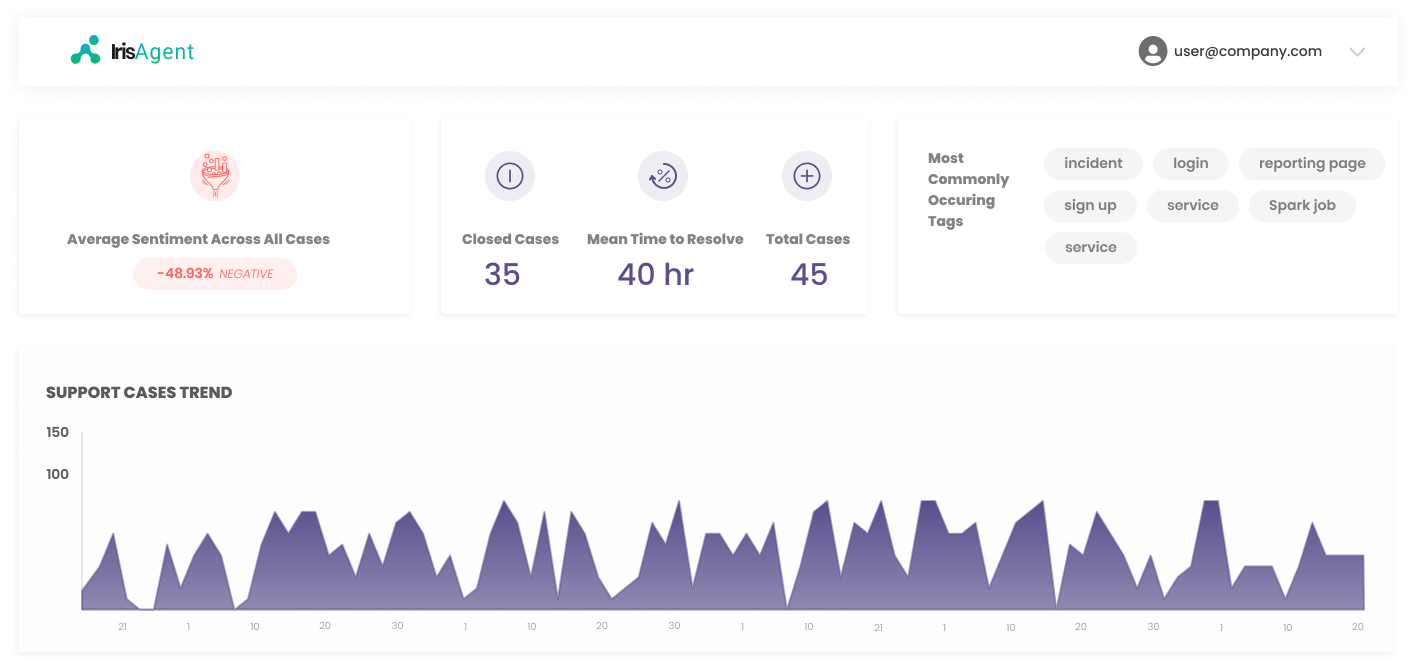5 Ways IrisAgent Provides Real Time Customer Experience Using Data
While the disruption of the COVID-19 pandemic accelerated the need for and use of real-time data, the concept itself is not new. Companies have been making a shift from relying purely on historical data, which can be outdated, to embracing more current and timely data. According to Gartner, by 2022, more than half of significant new business systems will leverage continuous intelligence to improve decisions using real-time context data.
Real-time data is data that is delivered immediately after it’s collected without any form of delay. In logistics, real-time data is used to provide accurate and timely information on the location of certain goods, containers, and vehicles. Likewise, in the healthcare sector, real-time data has been important in determining where vaccines, drugs, and staff are most needed and in what quantities.
Within companies, real-time data plays a significant role in driving customer experience across business functions and touchpoints. Specifically, in customer support, real-time data is no longer a nice to have but a necessity. Companies must know their customers’ needs, desires, and preferences in real-time and deliver experiences that satisfy them.
Real-time data provides a competitive advantage by enabling companies to meet customer needs and expectations promptly. Processing data as it arrives increases the chances of companies taking timely actions on it.
To stay agile and responsive to evolving customer expectations, companies need to take note of questions their customers are asking and issues they have reported to avoid repeat issues and improve future interactions.
What is Customer Support Operations?
Customer support operations refer to the set of processes, tools, and strategies that a company employs to address and manage customer inquiries, issues, and requests. These operations encompass various activities such as ticket management, customer interactions, problem resolution, and support staff coordination, all aimed at delivering efficient and satisfactory customer service.
Gathering and analyzing customer feedback is crucial for improving customer support operations. By continuously monitoring and implementing feedback, companies can enhance the customer experience at every interaction, promote products effectively, and gain insights into customer preferences and behaviors.
Understanding customer touchpoints through customer journey mapping can enhance support operations by identifying and addressing problem areas, ultimately shaping positive customer experiences and providing a competitive advantage.
What are the Advantages of Effective Customer Support Operations for Customer Satisfaction?
Customer support operations are integral to the success of any business, playing a vital role in ensuring customer satisfaction, loyalty, and the overall success of the organization. Here’s why customer support operations are crucial, along with their advantages:
Customer Satisfaction: A satisfied customer is more likely to remain loyal, make repeat purchases, and recommend the brand to others. Effective customer support operations are instrumental in resolving issues, answering questions, and providing assistance, all of which contribute to overall customer satisfaction.
Issue Resolution: Customers encounter problems or questions about products or services. Customer support operations serve as a primary channel for addressing these issues promptly and efficiently. Rapid issue resolution not only satisfies the customer but also prevents the escalation of problems.
Brand Reputation: Quality customer support contributes to a positive brand image. A company known for its responsive and effective customer service is likely to enjoy a strong reputation and customer trust. Providing superior customer experiences can enhance brand reputation and customer trust. Word-of-mouth recommendations and online reviews are often influenced by customer support experiences.
Customer Retention: It is typically more cost-effective to retain existing customers than to acquire new ones. Effective support operations can prevent customer churn by addressing concerns and building long-term relationships. Personalized and timely interactions in support operations can drive customer loyalty.
Feedback Collection: Customer support interactions provide an opportunity to gather valuable feedback about products, services, and customer experiences. This information can inform product improvements, marketing strategies, and business decisions.
Cross-Selling and Upselling: Support agents can identify opportunities for cross-selling or upselling related products or services, increasing revenue and customer lifetime value.
How do you build and improve your customer support operations?
Building and continuously improving customer support operations is essential for delivering excellent service and ensuring customer satisfaction. Here’s a comprehensive guide on how to establish and enhance your customer support operations:
1. Define Clear Objectives:
Start by setting clear and measurable goals for your customer support operations. This might include response time targets, customer satisfaction benchmarks, or specific issue resolution metrics.
2. Customer Experience Strategy:
Develop a well-defined customer experience strategy to guide your support operations. This strategy should focus on understanding and meeting evolving customer needs, leveraging continuous intelligence to drive real-time customer experiences, and creating a competitive advantage.
3. Assemble a Skilled Team:
Hire and train competent support agents who possess excellent communication and problem-solving skills. Invest in their ongoing development through training and workshops.
4. Choose the Right Tools:
Implement customer support software and tools that facilitate ticket management, analytics, and communication channels like email, chat, and phone. Consider CRM systems to track customer interactions and data. Embrace digital transformation tools like AI and automation to enhance your support operations and create a new age of customer experience.
5. Multichannel Support:
Offer support through multiple channels to accommodate customer preferences. These channels may include email, chat, social media, phone, and self-service options.
6. Self-Service Resources:
Create and maintain a robust knowledge base, FAQs, and help articles. Encourage customers to find answers to common questions independently.
7. Automation:
Use automation for routine tasks such as ticket routing, categorization, and data entry. Chatbots and AI can handle common inquiries, freeing up agents for more complex issues.
8. Feedback Collection:
Actively seek feedback from customers through surveys, post-interaction emails, or direct inquiries. Analyze feedback to identify areas for improvement.
9. Performance Metrics:
Monitor and measure performance using relevant KPIs. Key metrics include response and resolution times, customer satisfaction (NPS or CSAT scores), and agent productivity.
How IrisAgent uses Real Time Data to Improve Customer Experience?
IrisAgent believes in a proactive approach to customer support. That is, solving customer issues before the end-user becomes aware of them and resolving customer issues in the shortest possible time. This proactive approach is a key aspect of real-time CX, ensuring immediate and seamless customer interactions.
By using customer support software that gathers, analyzes, and visualizes customer data, support agents will have the information they need to be able to respond to customer issues effectively. IrisAgent combines Artificial Intelligence (AI) and real-time data to reduce customer churn, optimize agent productivity, and drive positive customer experiences.
Some of the ways IrisAgent uses real-time data to drive satisfying customer experiences include:
Preventing customer churn: IrisAgent’s real-time alerting capabilities notify companies when a customer is unhappy with their products. When a customer’s health or sentiment scores go down, IrisAgent immediately sends a warning to the company. Top areas of concern and problem areas are also visualized so that companies can know where they are falling short with a particular customer. Timely responses to these alerts can help prevent customer churn. Real-time data analytics helps identify and address customer issues promptly.

Workflow automation: IrisAgent automates the customer support operations workflow in real time. As soon as support tickets come in, they are automatically linked with internal Jira bugs. As soon as bugs are resolved, the customers are updated in real time. With support chats, IrisAgent offers suggested resolutions from knowledge articles and previous responses. For every incoming support ticket, IrisAgent assigns a relevant tag and passes it on to a domain expert using intelligent routing. The real-time analytics shows support operations management, which tags generate the most cases and show the time to resolve support tickets.
Team alignment: IrisAgent creates a tighter feedback loop with customers, engineering & products. Real-time alerts can be set up in support tickets for product or UX issues. This way, product teams can get accurate and timely information on how customers are using their products and their reactions to various features.
Proactive approach: Proactive customer support is at the heart of IrisAgent. Our real-time analytics capabilities enable companies to keep their fingers on the pulse of what their customers are feeling and experiencing. They can get a deeper understanding of how their products are used, and should there be a potential issue, they can get to them before the customers make any complaint and if possible, solve the issue before they notice it. Companies can turn a potential crisis into a positive outcome.
Discover opportunities: Are customers using your products optimally? By observing customers' preferences, needs, questions, and issues in real time, companies can unlock hidden opportunities. This could be in how to approach certain customers, optimizing certain features in a product, or even discovering a new touchpoint for the customer. These hidden opportunities can benefit other functional areas in the company, like the product team or the customer success team.
Access to real-time data is changing the way that customer support operates. If you’re struggling with delays, inefficiencies, and frequent engineering escalations internally, it’s likely that your customers are also suffering. Investing in software that combines real-time data with AI capabilities to boost support agent productivity, personalize customer engagement, and resolve tickets more quickly might be the game-changer your business needs.
With the fast-paced movement of the market, customers aren’t waiting for you to get it right, and neither are your competitors. With proactive support, you can stay ahead of the curve by turning every customer interaction into a positive customer experience.
Ready to get started with real-time data in your customer support operations? Book a demo with IrisAgent.





